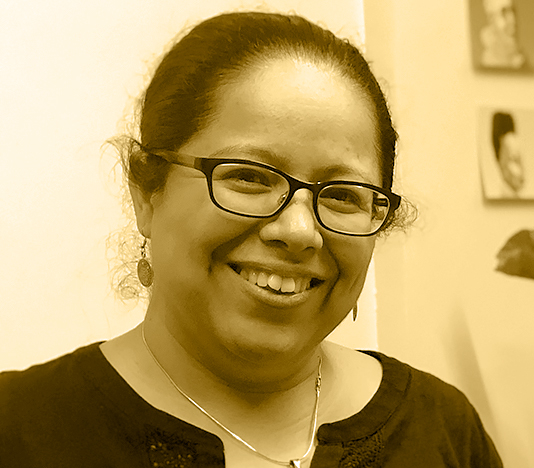Maribel Hernández Rivera '00

Maribel Hernández Rivera ’00 keeps a photo of her family on her office desk. In it, she is seated in the middle of a large dining table surrounded by her two brothers. Her arms are stretched wide hugging her mother and father. The picture was taken in Houston a few months after she first arrived in the United States. She was 13 years old. Her family was undocumented. “I keep it close to remind me of the struggles that my family went through; it is what keeps me going,” says the 38-year-old. “It’s also here to remind me of how far I have come.”
Born in Mexico City, the lifelong immigration advocate credits her four years at Phillips Exeter Academy for teaching her how to use one’s privilege and platform for social good. During her lower year, she attended a lecture given by representatives of the Free Tibet movement. She was so moved that she started the Exeter chapter of Students for a Free Tibet with a classmate. The club organized workshops and once led a monthlong fast to bring attention to the struggle of the Tibetan people. “Exeter not only helped me to grow academically, but also as a social advocate,” she says. “I learned that it was OK to advocate for what you believe and that I could use my privilege for social justice.”
Hernández Rivera carried those lessons forward, and is now the district director for Rep. Alexandria Ocasio-Cortez. In this role, Hernández Rivera manages the Democratic congresswoman’s New York City office, fields daily requests from constituents, and helps shape immigration policy. “I came to work with the congresswoman because she speaks truth to power and is someone who uses her platform to shed light on important social issues affecting marginalized communities,” she says.
Prior to this post, Hernández Rivera led a program in New York City that helped immigrants access municipal immigration legal services. She also worked for a nonprofit, supervising recent college graduates who assisted low-income families applying for immigration benefits. There was one undocumented immigrant, however, whom she was unable to help: her father, Roberto, who died tragically in a car accident. According to Hernández Rivera, her father was driving home to Texas after dropping her youngest brother, Yonatan, at the Norfolk Naval Station. The family learned of his death from a junkyard employee who had picked up her father’s cellphone and told them that the owner of the vehicle was dead. For a week they searched frantically for his body. “I felt helpless,” she remembers. “My father had identification on him and no one — not the emergency services, police officers, or staff at the morgue — called to notify us.”

The death of her father was a defining moment for Hernández Rivera. She went on to earn a master’s degree in public policy at the Woodrow Wilson School of Public and International Affairs at Princeton University and pursued immigration law at New York University School of Law. “I always dreamed that I would help my father sort out his status, but after his death, it cemented my mission to help others,” she says.
Today she feels her work on behalf of undocumented immigrants, including members of her immediate family, is more urgent than ever. Hernández Rivera’s husband, who came to the United States when he was 18 years old, now faces the possibility of deportation due to the end of Temporary Protected Status for Hondurans, a humanitarian protection granted in 1999 that has allowed him to live and work in the states for 20 years.
Having a family photo nearby inspires Hernández Rivera to keep going. “They keep me focused,” she says. “I was not able to help my father, but I will continue to help others.”
Editor’s note: This article first appeared in the summer 2019 issue of The Exeter Bulletin.